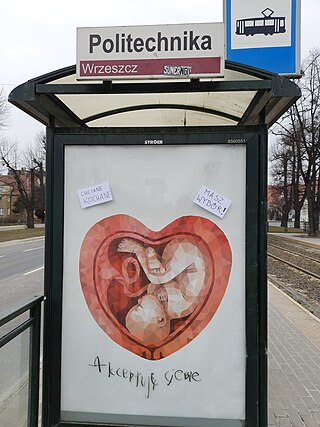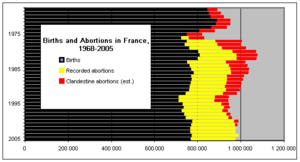Abortion in Ireland is regulated by the Health Act 2018. Abortion is permitted in Ireland during the first twelve weeks of pregnancy, and later in cases where the pregnant woman's life or health is at risk, or in the cases of a fatal foetal abnormality. Abortion services commenced on 1 January 2019, following its legalisation by the aforementioned Act, which became law on 20 December 2018. Previously, the 8th Constitutional Amendment had given the life of the unborn foetus the same value as that of its mother, but the 36th constitutional amendment, approved by referendum in May 2018, replaced this with a clause permitting the Oireachtas (parliament) to legislate for the termination of pregnancies.
The Eighth Amendment of the Constitution Act 1983 was an amendment to the Constitution of Ireland which inserted a subsection recognising "the equal right to life of the pregnant woman and the unborn". Abortion had been subject to criminal penalty in Ireland since at least 1861; the amendment ensured that legislation or judicial interpretation would be restricted to allowing abortion in circumstances where the life of a pregnant woman was at risk. It was approved by referendum on 7 September 1983 and signed into law on 7 October 1983. In 2018, it was repealed by referendum.

Abortion laws vary widely among countries and territories, and have changed over time. Such laws range from abortion being freely available on request, to regulation or restrictions of various kinds, to outright prohibition in all circumstances. Many countries and territories that allow abortion have gestational limits for the procedure depending on the reason; with the majority being up to 12 weeks for abortion on request, up to 24 weeks for rape, incest, or socioeconomic reasons, and more for fetal impairment or risk to the woman's health or life. As of 2022, countries that legally allow abortion on request or for socioeconomic reasons comprise about 60% of the world's population. In 2024, France became the first country to explicitly protect abortion rights in its constitution.
Abortion in Germany is decriminalized on demand during the first 12 weeks of pregnancy upon condition of mandatory counseling. The same goes later in pregnancy in cases that the pregnancy poses an important danger to the physical or mental health of the pregnant woman. In the case that the abortion is because of a rape counseling is not mandatory. The woman needs to receive counseling, called Schwangerschaftskonfliktberatung, at least three days prior to the abortion and must take place at a state-approved centre, which afterwards gives the applicant a Beratungsschein.
The timeline of women's legal rights (other than voting) represents formal changes and reforms regarding women's rights. The changes include actual law reforms, as well as other formal changes (e.g. reforms through new interpretations of laws by precedents). The right to vote is exempted from the timeline: for that right, see Timeline of women's suffrage. The timeline excludes ideological changes and events within feminism and antifeminism; for that, see Timeline of feminism.
Since 2021, abortion has no longer been a federal crime in Mexico. However, the criminal law in Mexico varies by state. On 7 September 2023, the Mexican Supreme Court unanimously ruled that penalising abortion is unconstitutional, setting a precedent across the whole country. Before 2019, abortion had been severely restricted outside of Mexico City, where it was legalized on-request in 2007. As of August 2023, abortion is available on request to any woman during the first twelve weeks of a pregnancy in Mexico City and the states of Oaxaca, Hidalgo, Veracruz, Coahuila, Colima, Baja California, Sinaloa, Guerrero, Baja California Sur, Quintana Roo, and Aguascalientes. However, even in states where abortion is legal, there continue to be women in pre-trial detention for murder due to spontaneous miscarriage.
The Twenty-fifth Amendment of the Constitution Bill 2001 was a proposed amendment to the Constitution of Ireland to tighten the constitutional ban on abortion. It would have removed the threat of suicide as a grounds for legal abortion in the state, as well as introducing new penalties for anyone performing an abortion, by giving constitutional status to legislation proposed to be enacted after the amendment. It was narrowly rejected in a referendum held on 6 March 2002, with 50.4% against.
This is a timeline of reproductive rights legislation, a chronological list of laws and legal decisions affecting human reproductive rights. Reproductive rights are a sub-set of human rights pertaining to issues of reproduction and reproductive health. These rights may include some or all of the following: the right to legal or safe abortion, the right to birth control, the right to access quality reproductive healthcare, and the right to education and access in order to make reproductive choices free from coercion, discrimination, and violence. Reproductive rights may also include the right to receive education about contraception and sexually transmitted infections, and freedom from coerced sterilization, abortion, and contraception, and protection from practices such as female genital mutilation (FGM).

The Criminal Law Amendment Act, 1968–69 was an omnibus bill that introduced major changes to the Canadian Criminal Code. An earlier version was first introduced as Bill C-195 by then-Minister of Justice Pierre Trudeau in the second session of the 27th Canadian Parliament on December 21, 1967, which was modified and re-introduced as Bill C-150 by then-Minister of Justice John Turner in the first session of the 28th Canadian Parliament. After heated debates, it passed third reading in the House of Commons by a vote of 149 to 55. The bill was a massive 126-page, 120-clause amendment to the criminal law and criminal procedure of Canada.
The Manifesto of the 343 is a French petition penned by Simone de Beauvoir, and signed by 343 women, all publicly declaring that they had had an illegal abortion. The manifesto was published under the title, "Un appel de 343 femmes", on 5 April 1971, in issue 334 of Le Nouvel Observateur, a social democratic French weekly magazine. The piece was the sole topic on the magazine cover. Back then, abortion was illegal in France, and by admitting publicly to having aborted, women exposed themselves to criminal prosecution.

The legality of abortion in the United States and the various restrictions imposed on the procedure vary significantly depending on the laws of each state or other jurisdiction. Some states prohibit abortion at all stages of pregnancy with few exceptions, others permit it up to a certain point in a woman's pregnancy, while others allow abortion throughout a woman's pregnancy. In states where abortion is legal, several classes of restrictions on the procedure may exist, such as parental consent or notification laws, requirements that patients be shown an ultrasound before obtaining an abortion, mandatory waiting periods, and counseling requirements.
The Dominican Republic is one of 24 countries in the world and one of six in Latin America that has a complete ban on abortion. This complete ban includes situations in which a pregnant person’s life is at risk.
Abortion in Belgium was fully legalised on 4 April 1990, following the temporary resignation of King Baudouin on grounds of conscience.
Abortion in Serbia was legalized in its current form on October 7, 1977. Abortion on demand is available for women whose pregnancies have not exceeded the tenth week, and in the case of risk to life or health of woman, or when the pregnancy has resulted from a sex offence, or in case of fetal impairment up to twenty weeks. Minors under 16 require parental consent before undergoing an abortion.
Abortion in Liechtenstein is illegal in most circumstances with limited exceptions in cases where the life of the pregnant woman is at risk, or where the pregnancy has resulted from a sexual offence. Religion in Liechtenstein is mainly Roman Catholic, which is reflected in the faith of the ruling Princely House of Liechtenstein and in the country's laws and culture around pregnancy.

Anti-abortion movements, also self-styled as pro-life movements, are involved in the abortion debate advocating against the practice of abortion and its legality. Many anti-abortion movements began as countermovements in response to the legalization of elective abortions.
The Neuwirth Law is a French law which lifted the ban on birth control methods on December 28, 1967, including oral contraception. It was passed by the National Assembly on December 19, 1967. The law is named after Lucien Neuwirth, the Gaullist politician who proposed it. It replaced a law from 1920 that not only forbade all forms of contraception, but also information about contraception. The law was not fully implemented until 1972 due to administrative delays.

The National Association of Abortion and Contraception Centers is a non-profit, non-governmental association of persons and professionals who work in pregnancy and abortion planning centers, in the private or public sector, in France, who provide advice on and support for abortion and contraception.

Abortion in Europe varies considerably between countries and territories due to differing national laws and policies on its legality, availability of the procedure, and alternative forms of support for pregnant women and their families.
The Loi Veil, officially the "Law of 17 January 1975 on the voluntary termination of pregnancy", is a law pertaining to the decriminalization of abortion in France. It was prepared by Simone Veil, minister of health during the presidency of Valéry Giscard d'Estaing.









